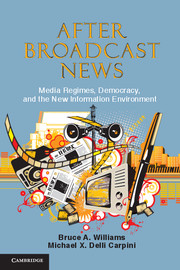Book contents
- Frontmatter
- Contents
- Acknowledgments
- 1 Is There a Difference Between Tina Fey and Katie Couric? Policing the Boundaries Between News and Entertainment
- 2 Media Regimes and American Democracy
- 3 And That's the Way It (Was)
- 4 Political Reality, Political Power, and Political Relevance in the Changing Media Environment
- 5 Politics in the Emerging New Media Age
- 6 When the Media Really Matter
- 7 9/11 and Its Aftermath
- 8 Shaping a New Media Regime
- References
- Index
8 - Shaping a New Media Regime
Published online by Cambridge University Press: 05 June 2012
- Frontmatter
- Contents
- Acknowledgments
- 1 Is There a Difference Between Tina Fey and Katie Couric? Policing the Boundaries Between News and Entertainment
- 2 Media Regimes and American Democracy
- 3 And That's the Way It (Was)
- 4 Political Reality, Political Power, and Political Relevance in the Changing Media Environment
- 5 Politics in the Emerging New Media Age
- 6 When the Media Really Matter
- 7 9/11 and Its Aftermath
- 8 Shaping a New Media Regime
- References
- Index
Summary
It is hard to picture the contemporary world, even in the face of a technology that makes each of us potentially equal senders and receivers of information, without a specialized institution of journalism.
– Michael Schudson, The Power of News, 1995Political beliefs and actions spring from assumptions, biases, and news reports. In this critical sense politics is a drama taking place in an assumed and reported world that evokes threats and hopes, a world people do not directly observe or touch.…The models, scenarios, narratives, and images into which audiences for political news translate that news are social capital, not individual inventions. They come from works of art in all genres: novels, paintings, stories, films, dramas, television sitcoms, striking rumors, even memorable jokes. For each type of news report there is likely to be a small set of striking images that are influential with large numbers of people, both spectators of the political scene and policymakers themselves.
– Murray Edelman, From Art to Politics, 1996Truth is so great a thing that we ought not to despise any medium that will conduct it to us.
– Michel de Montaigne, Essays, 1575Between December 2004 and April 2005, all three anchor positions for the nightly network news became open when Tom Brokaw retired, Peter Jennings was diagnosed with lung cancer, and Dan Rather was forced out as a result of allegations (tellingly driven by conservative bloggers, talk-show hosts and other elements of the new media environment) about the use of forged documents in CBS's coverage of George W. Bush's Air National Guard service. The sudden changes at all three networks came amid greater uncertainty about the shape and even the survival of broadcast news. As we discussed in , audiences for the network news have precipitously declined and aged over the past two decades. Between March 2007 and March 2008 alone, CBS nightly news lost 21 percent of its eighteen- to thirty-four-year-old viewers, ABC lost 13.5 percent, and NBC lost 10.1 percent, with the average age for viewers of all three newscasts increasing to sixty-one (Fitzgerald ).
- Type
- Chapter
- Information
- After Broadcast NewsMedia Regimes, Democracy, and the New Information Environment, pp. 278 - 326Publisher: Cambridge University PressPrint publication year: 2011



